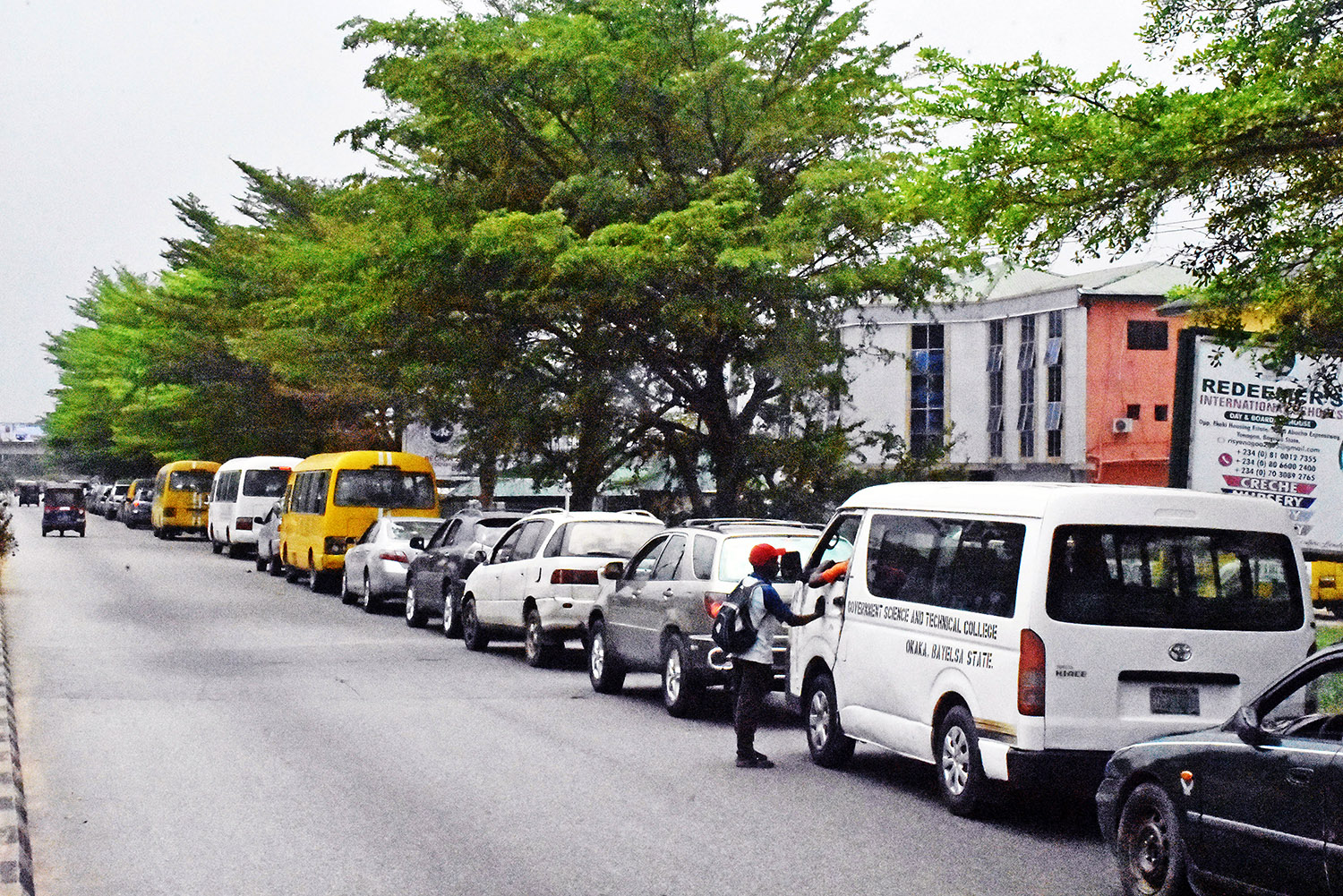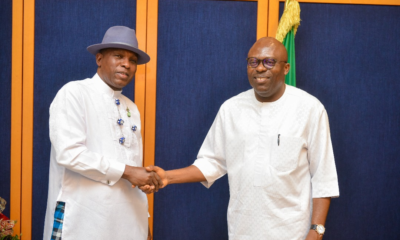Business
Promoting Job, Wealth Creation Via Creative Industry
By most accounts, creative industry refers to a range of economic activities that are concerned with the generation or exploitation of knowledge and information.
It is a broad domain in which activities related to creative works’ design or production are carried out. Etymologists, however, maintain that term creative industry is synonymous with entertainment industry.
David Parrish, a creative industry management consultant, describes creative industry as “business with creativity’’.
Creative industry, according to him, comprises design, music, publishing, architecture, film and video, crafts, visual arts, fashion, television and radio services, advertising, literature, computer games as well as performing arts.
However, the United Nations Conference on Trade and Development (UNCTAD) describes the “creative economy’’ as an emerging concept, which deals with the interface between creativity, culture, economics and technology in a contemporary world dominated by images, sounds, texts and symbols.
UNCTAD adopted a pragmatic approach in promoting creativity and innovation in Africa in 2008 when it organised a conference on the subject in Accra, Ghana, on April 2008.
The UNCTAD report on the status of the world’s creative industry affirms that the creative industry is one of the most dynamic sectors of the economy that is capable of creating jobs and wealth for the people.
It states that the sector provides new opportunities for developing countries to leapfrog into emerging high-growth areas of the world economy.
Moreover, the UK Department for Culture, Media and Sports says that creative industry originates from the people’s creativity, skills and talents, which all have the potential for creating wealth and jobs via the exploitation of the intellectual property.
These enlightened opinions tend to reinforce existing viewpoints that a well-harnessed creative industry has the potential of kick-starting the economic growth of many countries and empowering millions of people across the world.
Industry experts insist that there is no ceiling in efforts to harness the potential of the creative industry of any nation.
Nevertheless, Mr Afam Ezekude, the Director-General of the Nigerian Copyright Commission (NCC), said that the intrinsic qualities of Nigeria’s creative industry could only be harnessed if the stakeholders resolved to do the right things in the right way.
In his remarks at the National Creativity Day Celebration in Abuja in April, Ezekude stressed that the NCC was carrying out a comprehensive study of the country’s creative industry so as to ascertain the exact worth of the sector in terms of job creation.
He noted that the preliminary findings of the study indicated that the film sector alone was capable of contributing N45 billion to the national economy if the potential of the sector was properly harnessed.
“There are strong indications that the projected N1 trillion-per-annum revenue from the sector could be exceeded.
“We are working in concert with the World Intellectual Property Organisation (WIPO) in the study to ascertain the value of the creative industry in our economy.
“From our preliminary findings, however, the film sector can contribute N45 billion to the economy, the software sector can contribute N250 billion; publishing sector, N100 billion; music, N80 billion; broadcasting, N25 billion; advertising, N20 billion, while ICT, textiles and jewellery can contribute N100 billion.
“This, in essence, means that the sector currently contributes less than 5 per cent of the projected sum to the nation’s economy,’’ he said.
“Therefore, it can aptly be deduced that the creative industry holds the key to the transformation of the economies of developed and developing countries of the world,’’ he added.
Ezekude, nonetheless, voiced concern about some factors that were hindering the growth of the creative sector; saying that the copyright laws of many developed and developing countries were weak, inefficient or non-existent in some cases.
“In Nigeria, for instance, the framework for the regulation and protection of intellectual property is weak and I have, on different occasions, drawn the stakeholders’ attention to this defect.
“The existing laws are not stringent enough to deter pirates from infringing on the rights of copyright owners in the country; there is the need to strengthen the laws.
“For example, N250, 000 is the highest fine ever imposed by a court in a single copyright infringement case in the history of the commission’s prosecution efforts.
“Other punishments, depending on the charges, attracted at most, six months jail for a copyright infringement and these penalties are too weak to deter potential bandits from perpetrating product piracy or counterfeiting,’’ he said.
Besides, Ezekude emphasised that the lack of prioritisation of copyright matters in Nigeria’s national development plans was another major factor inhibiting the development of the creative sector.
He conceded that the factor particularly contributed to problems such as limited financial and infrastructure resources, manpower constraints and inadequate public awareness.
“The uncooperative attitude of some stakeholders; slow judicial processes and weak border controls to check importation of pirated works were some of the factors hindering the growth of the creative industry,’’ he said.
Ezekude stressed that the existence of more than 15 product-replicating plants across the country underscored the need to urgently put in place an effective protection framework.
However, many stakeholders believe that Nigeria can derive a lot of economic benefits from the creative sector with the legendary exploits of writers such as Prof. Wole Soyinka and Prof. Chinua Achebe in the literary world.
They, however, bemoan the fact that the rich resources of the country’s film and music industry, pottery and earthenware as well as arts and crafts are not fully utilised for national development.
Mrs Clarah Dapira, an expert in creativity and rural development, said that many developing countries such as Thailand had adopted the creative industry as an alternative means of eliminating poverty at the grassroots.
She said that Thailand got the idea from Japan, as the Japanese government initiated the poverty eradication strategy in 1979.
“The approach is being replicated by many Asian countries such as Cambodia, Malaysia and Thailand. Some African countries such as Malawi and Ethiopia have also adopted the strategy,’’ she said.
All the same, Ezekude said that Nigeria could develop and maximise the potential of its creative sector if an effective protection and regulatory framework was put in place to protect creative works from unauthorised users.
He stressed that efforts should be made to foster the growth of the country’s creative industry via purposeful legislation which would give the regulatory authorities the powers to curtail the aberrant activities of pirates.
Ezekude also underscored the need for more efficient and speedy judicial process in Nigeria, while ensuring stricter border controls to stem the importation of pirated works.
However, Mr Mike Akpa, NCC’s Director of Legal Services, said that the commission was making extra efforts to check piracy and stamp out imports of pirated products.
He said that apart from its periodic anti-piracy raids, the commission had also signed an agreement with an ICT company as part of plans to stimulate increased creativity in the industry.
Akpa noted that under the agreement, patent owners of creative works would now earn some money for the use of their works.
He assured all the stakeholders that the NCC would strive to protect the copyrights of inventors of creative works, in line with its zero-tolerance on piracy.
Akpa, nonetheless, stressed that the interests of all the copyright owners of creative works in the country were being promoted by the NCC via effective and decisive measures.
He said that the measures included the Copyright Notification Scheme, which was introduced to allow authors to have credible evidence of their copyrights.
Akpa, however, stressed the need to stimulate the citizens’ participation in programmes aimed at promoting the growth of the creative industry via pragmatic public awareness campaigns
He also urged all the stakeholders to work as a team in ongoing efforts to harness the potential of the creative industry for wealth creation.
Zoho writes for NAN
Jude Zoho
Business
Fuel Scarcity: IPMAN threatens shutdown over bridging claims

The Independent Petroleum Marketers Association of Nigeria (IPMAN) Depot Chairmen Forum, has exonerated its members from the current fuel scarcity in the country.
According to IPMAN, this is caused by its inability to source petroleum products.
The IPMAN Depot Chairmen Forum also threatened to withdraw its services over non-payment of N200 billion bridging claims by the Nigerian Midstream and Downstream Petroleum Regulatory Authority (NMDPRA) to its members, since 2022.
Alhaji Yahaya Alhassan, the Chairman, of the Forum said this while briefing newsmen in Abuja, yesterday.
Alhassan said the Nigerian National Petroleum Company Limited (NNPC Ltd.) was the sole importer of the product, but the marketers could not source products from NNPC Ltd. deport, rather from the private depots at high rate.
“We cannot buy fuel from the private depots at N950 and transport the product from Lagos to the North and other parts of the country with N2 million and still sell it at N900 or N1, 000.
“It is expedient for us to state that we are more pained by the non-availability of petroleum products in the country, which has given rise to another round of untold hardship for Nigerians.
“Contrary to claims that IPMAN members are hoarding Premium Motor Spirit (PMS) known as fuel, we would like to categorically state that PMS scarcity is wholly triggered by inability to get fuel from NNPC and not IPMAN,’’ he said.
Meanwhile, the NNPC Ltd. Chief Corporate Communications Officer, Olufemi Soneye said the disruption was due to logistical issues which had since been resolved.
“We currently have an availability of products exceeding 1.5 billion litres, which can last for at least 30 days. Unfortunately, we experienced a three-day disruption in distribution due to logistical issues, which has since been resolved.
“However, as you know, overcoming such disruptions typically requires double the amount of time to return to normal operations.
“Some folks are taking advantage of this situation to maximise profits. Thankfully, product scarcity has been minimal lately, but these folks might be exploiting the situation for unwarranted gain,’’ Soneye said.
He however, said the lines would clear out soon.
On the non-payment of bridging claims, the IPMAN forum said it was distressed and depressed by the laidback attitude of the NMDPRA towards the survival its member’s businesses, arising from its refusal in paying the claims.
“It is with deep frustration that we have assembled here today as the IPMAN Depot Chairmen Forum. It is also disheartening to note that some of our members have completely shut down businesses and retrenched employees.
“As businessmen and women, our members acquired bank loans to keep their fuel retail outlets running on a daily basis across the nooks and crannies of Nigeria in order to serve the teeming population of Nigerians,’’ Alhassan said.
He recalled that Sen. Heineken Lokpobiri, Minister of State Petroleum Resources (Oil), at a stakeholders meeting in February mandated the NMDPRA management to clear the entire debt in 40 days.
“However, today, we have crossed the 40 days’ time lapse given to the NMDPRA to clear the debt, and it is shameful to state that only the paltry sum of N13 billion has been paid, ignoring minister’s directive.
“We are not happy with the indiscriminate increment in the issuance and renewal of Sales and Storage Licence, by the NMDPRA, and the subsequent delays in acquiring the licence, which our members are recently subjected to.
“We are also calling on President Bola Tinubu to look into this unwholesome figure which is highly detrimental to our business and reverse it forthwith, as it is bound to impact negatively on the masses.
“We are poised to take far reaching decisions that may cripple the supply and sales of petroleum products across Nigeria if our demands are not met within the shortest period of time.
“We are collectively prepared to withdraw our services, shut down every single outlet, and suspend lifting of products forthwith till our demands are fully met, and the consequences will be terrible.
“We call on our members to however remain resolute and law abiding, even as we draw close to the immediate ultimatum for our demands to be met by the NMDPRA,’’ the chairman said.
Reacting to the IPMAN’s claims, the Acting Head, Corporate Communications, NMDPRA, Seiyefa Osanebi said the bridging claims payment was ongoing.
“The bridging claims payment is always an ongoing process,” she said.
Maritime
Shippers’ Council Registers 160 Port Operators

The Nigerian Shippers Council (NSC) says it has registered 160 Port stakeholders into its Regulated Port Service Provider and Users platform since the initiative began in 2023.
Executive Secretary, NSC, Mr Pius Akutah, made the disclosure on the sideline of a sensitisation programme by the commission for port operators in Lagos, with the theme, “Regulated Port Service Provider and Users”.
Represented by the Director, Consumer Affairs, Chief Cajetan Agu, Akutah emphasised the significance of the programme for stakeholders.
He said the sensitisation programme was the second edition after its commencement during the last quarter of 2023.
The Secretary said the 160 registered port operators consist of agencies, terminal operators, shipping companies, individual port users as well as service providers.
“We invited the ports stakeholders for enlightening them on the processes for online registration of Regulated Port Service Provider and Users.
“We have demonstrated to them how to register and how to make payment and we were able to present before them the various categories of the registration.
“The rate of payment is also in the registration. The payment of each group depends on the operation. A shipper pays N30,000, terminal operators and shipping companies pay N300,000, truckers also pay N30,000, while some pay N50,000 and N100,000.
“The Council was able to intimate them on the benefits, because port users benefit more as we help to interface on reducing port charges from time to time”, Akutah said.
He said that there was a need to continue to work with port operators to stop delays and eliminate high costs to make the port efficient.
Also speaking, the Deputy Director, Stakeholders, Service, NSC, Mr Celestine Akujobi, said “the sensitisation exercise was important for the council to enable us bring all the port stakeholders together”.
According to him, this is to avoid challenges during the implementation of the council’s responsibilities.
“By the time we introduce sanctions on defaulters, no operators will complain that he or she is not aware of the registration.
“I’m happy with the turnout of this sensitisation. This shows that the operators are well informed of the statutory friction of the council as the port regulator.
“The final implementation will commence as soon as we discover that all the operators have keyed into the portal.
“We are engaging other ports across the country and we’re hopeful that before the last quater of 2024, the council will implement sanctions on defaulting operators”, Akujobi said.
Earlier, Vice Chairman, National Association of Government Approved Freight Forwards (NAGAFF), Dr Ifeanyi Emoh, said port challenges were enormous, adding that they originated from some of the government agencies.
Emoh urged the council to look into regulating other government agencies, so that there could be a window through which they can collect port charges collectively instead of indiscriminately.
By: Chinedu Wosu
Business
Chivita, Hollandia Reward Outstanding Trade Partners At Annual Conference

Chivita| Hollandia (CHI Limited) leading fruit juice and value-added dairy manufacturer in Nigeria has rewarded its long standing distributors at the recently held 2024 Distributor Conference. The event with the theme, “Break Boundaries Exceed Expectations” served as a platform to recognise and reward the exceptional contribution of the distributors and wholesalers who play a critical role in Chivita|Hollandia (CHI Limited) success and business goals for the year.
The Distributor Conference was held in two sessions. While the morning session featured keynote addresses, industry insights and brand immersion experience, the evening session was a cultural display of elegance and funfair that culminated in the award presentation and recognition of the contribution the trade partners made to the company in the 2023 year under review.
A key highlight of the event was the award ceremony which acknowledged outstanding trade partners in various regions across the country. The awards recognized commitment, dedication, and outstanding performance in areas of sales growth, brand promotion, and market expansion.
Eelco Weber, Managing Director, Chivita|Hollandia (CHI Limited), stated that the company’s success story is incomplete without the strong partnerships it has built with trade partners. “Today, we celebrate not only the achievements, but the collaborative spirit that has made our growth possible” he said.
Bola Arotiowa, Chief Commercial Officer, Chivita|Hollandia (CHI Limited), in his statement revealed that, the event which was first of its kind will continue to be an annual meeting to enable the company work more closely with its distributors, share insights and action points, help the trade partners familiarize themselves with the company’s goals and objectives for each year, and serve as a driver for mutual success.
“Our distributors are the backbone of Chivita|Hollandia (CHI Limited). Their relentless efforts in distributing our products, promoting our brands, and expanding our reach across the nation is truly commendable. As the bridge between us and our valued consumers, it is very important to reward their hard work and dedication for being an essential part of the Chivita|Hollandia (CHI Limited) family. Together, we will continue to deliver great products to our conusmers which in turn will deliver value to them”, Mr. Arotiowa added.
Speaking at the conference, HajiyaBilikisuSaida, Chief Executive Officer of Smabirm Nigeria Limited, who won the Outstanding Distributor of the Year in North 1 region, and got a reward of two million Naira worth of Chivita|Hollandia (CHI Limited) products expressed delight at the company’s recognition, and stated that the awards served as a way to inspire distributors to do more and put in more effort, which in turn would help both the distributors and the company to grow.
Other outstanding performance distributors of the year rewarded with a two million Naira worth of Chivita|Hollandia (CHI Limited) stock include, Sunny Chuks Limited for East 1 region, MRS FA & Sons Limited for East 2 region, Hussakas Ventures for North 2 region, Rookee 1388 Ventures for Lagos 1 region, Pik N Pil Ventures for Lagos 2 region, FaithJoe Event Management Limited for West 1 region, and Progress Family Nigeria Enterprise for West 2 region.
The annual Distributors Conference aims to strengthen the bond between Chivita|Hollandia (CHI Limited) and its trade partners. This collaborative approach fosters mutual growth and ensures the continued success of the brands in the Nigerian market.
-

 Nation1 day ago
Nation1 day agoIbom Developers Supports 160 Women with Skill Acquisition Training in Akwa Ibom
-
Niger Delta1 day ago
Fire razes 4 shops in Edo
-
News1 day ago
Reps Order NERC To Suspend Implementation Of New Electricity Tariff
-
Niger Delta1 day ago
Calabar Port Dormant In 25 years -Manager
-
News1 day ago
FG Flags Off PH-Aba Train Service
-

 Featured1 day ago
Featured1 day agoDraw Up Futuristic Policies To Strengthen Governance, Fubara Tells NISS Team …Says Rivers’ll Deploy AI To Drive Dev, Tackle Political Crisis
-
News1 day ago
Drama As Senators Jostle For Seats In Newly Renovated Chamber
-

 Niger Delta1 day ago
Niger Delta1 day agoDiri swears in 14 Commissioners, Revenue Chairman

